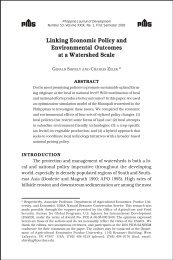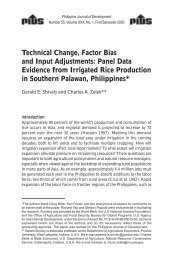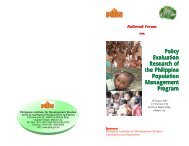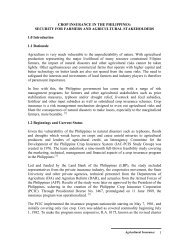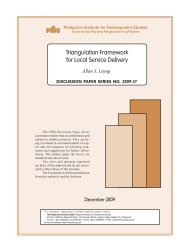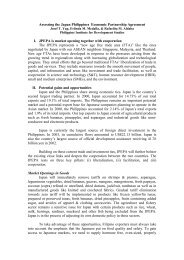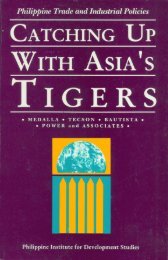Read More - Philippine Institute for Development Studies
Read More - Philippine Institute for Development Studies
Read More - Philippine Institute for Development Studies
You also want an ePaper? Increase the reach of your titles
YUMPU automatically turns print PDFs into web optimized ePapers that Google loves.
63<br />
Determining corn farmers’ decisions<br />
based on SCFs<br />
Gian Carlo M. Borines, Rotacio S. Gravoso,<br />
Canesio D. Predo *<br />
The advent of the anomalous weather and climate<br />
conditions aggravated by global warming has<br />
underscored the need to disseminate climate<br />
in<strong>for</strong>mation to guide farmers in their farm decisions.<br />
Advance climate in<strong>for</strong>mation, like the seasonal climate<br />
<strong>for</strong>ecast (SCF), helps farmers decide which land to use <strong>for</strong><br />
a particular crop, chart out production schedules, and<br />
devise commercialization strategies—decisions that are<br />
normally made by farmers long be<strong>for</strong>e the sowing season<br />
starts. Experiences from other countries show that the risk<br />
of production losses due to anomalous climatic conditions<br />
can be mitigated if farmers are aware of and use SCF.<br />
In the <strong>Philippine</strong>s, the project, “Bridging the gap<br />
between seasonal climate <strong>for</strong>ecasts and decisionmakers<br />
in agriculture,” funded by the Australian Centre <strong>for</strong><br />
International Agricultural Research (ACIAR), has shown the<br />
possibility <strong>for</strong> farmers to improve their income if they use<br />
SCF. Thus, the project intends to actively disseminate and<br />
encourage farmers to incorporate SCF into their farming<br />
practices.<br />
Central to the use and application of climate<br />
in<strong>for</strong>mation is the decisionmaking by farmers. Based on<br />
existing literature, in dealing with uncertain climate<br />
in<strong>for</strong>mation, farmers engage themselves in descriptionand<br />
experience-based modes of decisionmaking,<br />
thereupon increasing the risks of possible losses. This<br />
study was there<strong>for</strong>e conducted to find out how farmers<br />
will decide if they are presented with probabilistic climate<br />
<strong>for</strong>ecasts.<br />
Methods<br />
This study was conducted in Brgy. Miglamin, Brgy. Laguitas,<br />
and Brgy. Magsaysay in Malaybalay City, Bukidnon<br />
Province in consultation with the Department of<br />
Agriculture in Malaybalay City.<br />
____________<br />
*<br />
Staff and faculty, Visayas State University.<br />
A focus group discussion (FGD) was conducted to<br />
gather the background on the farmers’ exposure, access<br />
and use of SCF. To find out about the farmers’<br />
decisionmaking based on uncertain in<strong>for</strong>mation, two<br />
decisionmaking workshops were conducted. In each<br />
workshop, farmer participants were made to assume five<br />
varying hypothetic assumptions wherein they have<br />
experienced unfavorable cropping seasons in the past<br />
three consecutive years (March–June, 2005–2007). The<br />
participants were then presented with a climate <strong>for</strong>ecast<br />
(in video) developed specifically <strong>for</strong> this study (Table 1).<br />
Subsequently, farmers were asked to make decisions or<br />
courses of action <strong>for</strong> the next cropping season based on<br />
the <strong>for</strong>ecast (Table 2). A total of 30 farmers participated in<br />
the two workshops.<br />
Highlights of results<br />
Exposure and access to SCF in<strong>for</strong>mation<br />
Data showed that farmers in this study were aware of SCFs<br />
and climate in<strong>for</strong>mation. Farmers, especially those who<br />
are planting in big areas of land or are producing crops<br />
on a large scale, pay visits to the PAGASA station in<br />
Malaybalay or the Department of Agriculture (DA) office<br />
to consult on what the climate would be like be<strong>for</strong>e they<br />
begin to plant and what crops would be best to plant.<br />
In<strong>for</strong>mation obtained from these consultations is used to<br />
schedule the time of planting and to decide on which<br />
crop to plant.<br />
Not all farmers in Malaybalay, however, are able to<br />
go to the city proper to inquire about the climatic<br />
conditions. Thus, PAGASA and the DA hold seminars and<br />
<strong>for</strong>a about the climate in areas surrounding the province.<br />
Likewise, staff from the PAGASA station are invited<br />
occasionally to air climate <strong>for</strong>ecasts and issues over the<br />
local radio station.<br />
Evaluation of SCF in<strong>for</strong>mation<br />
Farmers reported that they get climate <strong>for</strong>ecasts from the<br />
radio or television through the national stations. In<br />
general, they felt that climate <strong>for</strong>ecasts are helpful.<br />
However, to be more useful, they suggested some<br />
changes. These suggestions include: 1) avoid the use of



